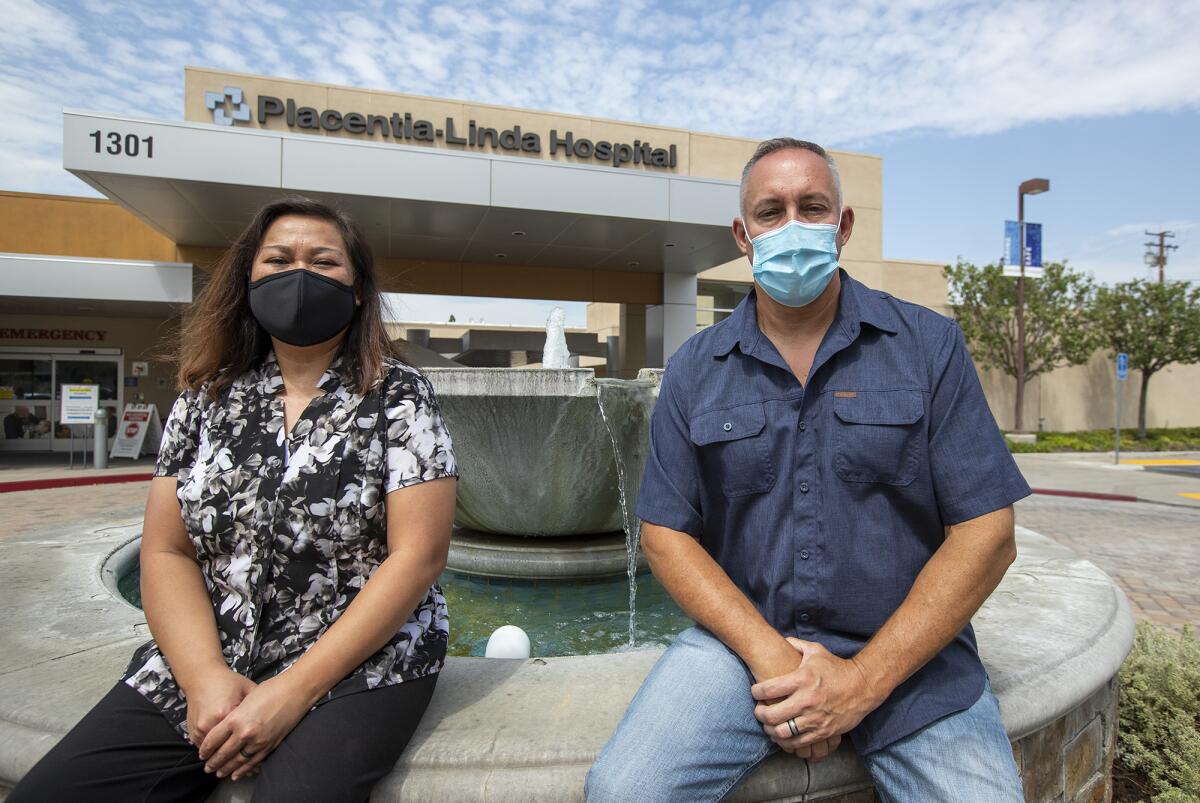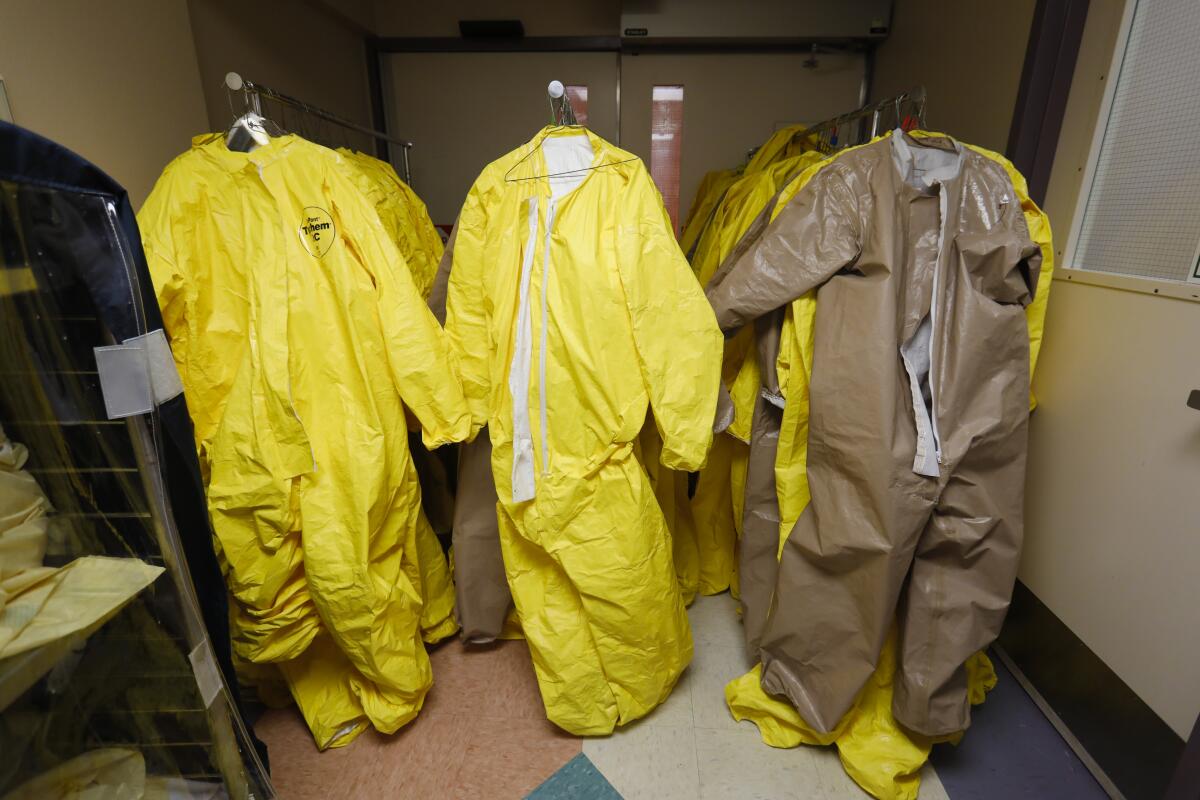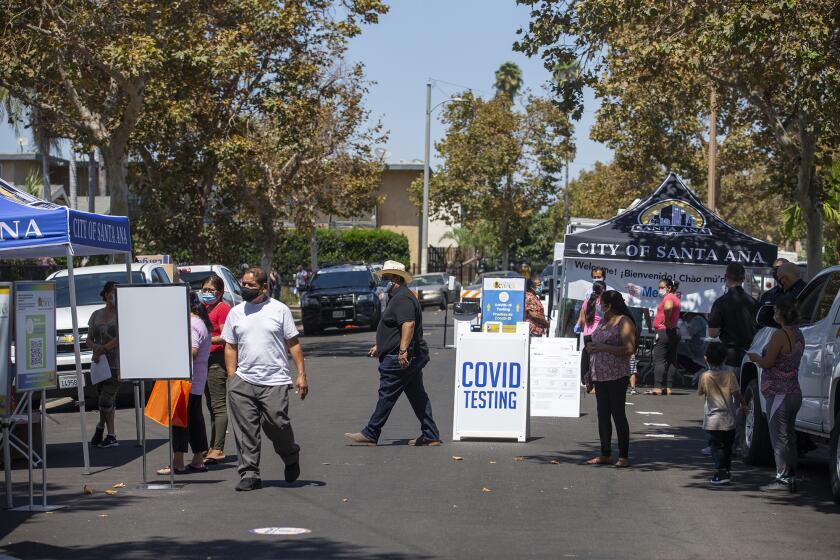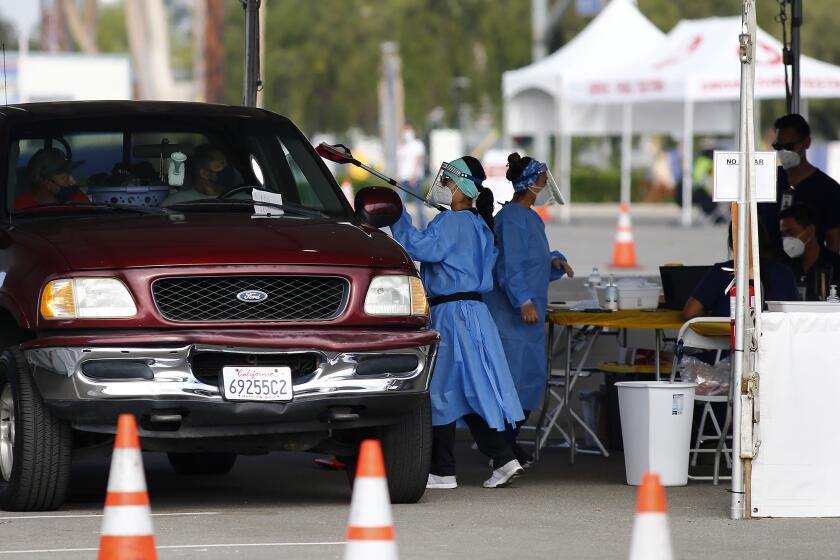How Placentia-Linda Hospital nurses forge through a night shift

A nurse’s role in a hospital is tough and, in one of the nation’s hot spots, the coronavirus made it tougher.
As of early this week, state health officials removed Orange County from the coronavirus watch list when the county’s number of newly infected people fell below 100 per 100,000 residents over a two-week period.
But the current demand for medical workers is high nationwide, so much so that some hospital officials requested local public health departments and the state to help bolster their staffing. A shortage of medical workers existed before the pandemic, and a surge in cases made it worse. In July, active-duty military doctors, nurses and other providers were sent to eight California hospitals to assist with coronavirus cases in Lodi, Fresno, Stockton, Rancho Mirage and Visalia.
If you ask registered nurses what it’s like to work nowadays, the common answer is what you would imagine.
Busy and exhausting.
Those are the adjectives that four Placentia-Linda Hospital nurses agreed on to describe working in the emergency department. The group of nurses, who come from military backgrounds, found their calling and have been at it for more than a decade.
“Sometimes I get lucky on my shift and we do a team approach where the charge nurse or a co-worker of mine will gown up with me, and we’ll knock everything out. And that really does help a lot,” said Erma Zins, who served in the U.S. Air Force for 16 years and as a nurse for 20 years.
Santa Ana rolled out a Mobile Resource Center on Wednesday that will provide free COVID-19 testing, masks and information on assistance programs for low-income neighborhoods most impacted by the virus.
“I think our military background is like, we have a job to do, and we don’t stop until the job is done,” said Ron Goble, who retired as an Air Force master sergeant after 20 years. “When I’m working with Erma, because she’s military as well, I know that she’s going to have my back, I’m going to have her back.”
“It’s just instantaneous comradery,” Zins chimed in.
“Just being willing to help others and help our teammates — that makes for a much more enjoyable shift,” said Dawn Smith-Looney, who’s worked as a nurse for 22 years and started as a medic while in the Air Force.
Jeremy Salazar, a charge nurse with nearly 30 years of experience, said “[Navy training] matured and prepared me so that I don’t crack under pressure. Hardly ever seem to get upset because I am pretty much ready for whatever comes my way.”
Although the nurses declined to speak about experiences with patients, they discussed an overview of their work during a night shift.
Alarms go off in the afternoons
Zins takes a shower and gets ready around 3 p.m. Her 8-year-old son and a 12-year-old daughter typically ask what’s for dinner. They like to eat early and spend time together.
“It’s unfair to them for me to just sleep all day and then get up and go, especially at that age,” Zins said.
Goble’s wife is also a nurse, and he usually makes dinner so it’s ready when she gets home.
“If we’re lucky, we can spend about 45 minutes together before I leave the house at 6:15 p.m.,” Goble said.
Smith-Looney’s start is similar, sans kids. She likes to sit and have coffee before getting her equipment ready and mind set for the day.
Salazar gets ready around 5 p.m., spends time with his wife, watches TV and makes sure to pray before he goes to work.
Clocking in
Zins likes to check-in early for work — about 10 minutes or more before 7 p.m.
This year clocking in for all staff means getting a temperature check, symptom screening and wearing a face mask at all times.
Once nurses settle in, they put on their gear — hazmat-like gowns, N95 masks and face shields. Salazar likes to layer a third surgical face mask.
Charge nurses like Salazar write assignments on the board, and night shift nurses get a report from the day shifters. If it’s a typical night, each nurse starts with about four patients.

Patients are also screened for symptoms when they arrive. Those who may have the coronavirus or who have tested positive are separated from the rest in the negative pressure room.
The biggest struggle for Goble is limiting contact time with patients.
“I tell them up front that I will be coming back when we have results and when it’s time for discharge so they’re not wondering, ‘Where are my nurses?’” Goble said. “We don’t have the resources, the PPE or the time to just go in and say, ‘Hi, how are you doing?’”
Sometimes they use signs with written questions asking how they are doing to communicate through a window or use the intercom system to talk to the patient in the room.
Salazar makes sure that the staff take their lunch breaks and follow policies in their areas. He’ll jump in and take on full assignments when the ER is overwhelmed with patients.
Breaks consist of taking off PPE, eating quickly and putting PPE back on.
Zins said she’s usually exhausted by 1 a.m. but that’s what coffee is for.
“The shift is continuous hand-washing, taking care of yourself and monitoring the patient. It’s quite difficult because every time you enter the room, you have to have your full-blown PPE on, and it is just time consuming and hot in that gear. I sweat a lot,” Zins said.
Clock out. Go home. “Decon” time.
Once the nurses get home after clocking out around 7 a.m., they remove scrubs and throw them in a washing machine or plastic bag. Then, they try not to touch anything or anyone and head straight to the shower.
“We noticed from watching the news how fast [COVID-19] was spreading so we had already made preparations to protect ourselves and one another,” Salazar said. “My son works at a grocery store, so they consider him a frontline worker as well.”
O.C. Health Care Agency Director Dr. Clayton Chau estimated the Costa Mesa testing site would process about 500 tests per day before ramping up to around 1,000 daily tests by month’s end.
Salazar’s 29-year-old son also has the same decontamination routine.
Goble said he’ll try to decompress until about 9:30 a.m. He’ll have breakfast and Tylenol (if it’s been a rough night). Decompressing means watch something that doesn’t require too much thinking. “Bering Sea Gold” and “How It’s Made” are his current favorite shows. He’ll usually pass out on the couch and wake up when the show’s over.
Zins has to watch something too — anything nonmedical. She likes crime shows. Smith-Looney goes for music shows. Salazar reads the Bible or books his mom sends him, usually something religious.
Goble said if he is lucky he will sleep until 3 p.m.
Then, they wake up, go back to the hospital and start again.
All the latest on Orange County from Orange County.
Get our free TimesOC newsletter.
You may occasionally receive promotional content from the Daily Pilot.






